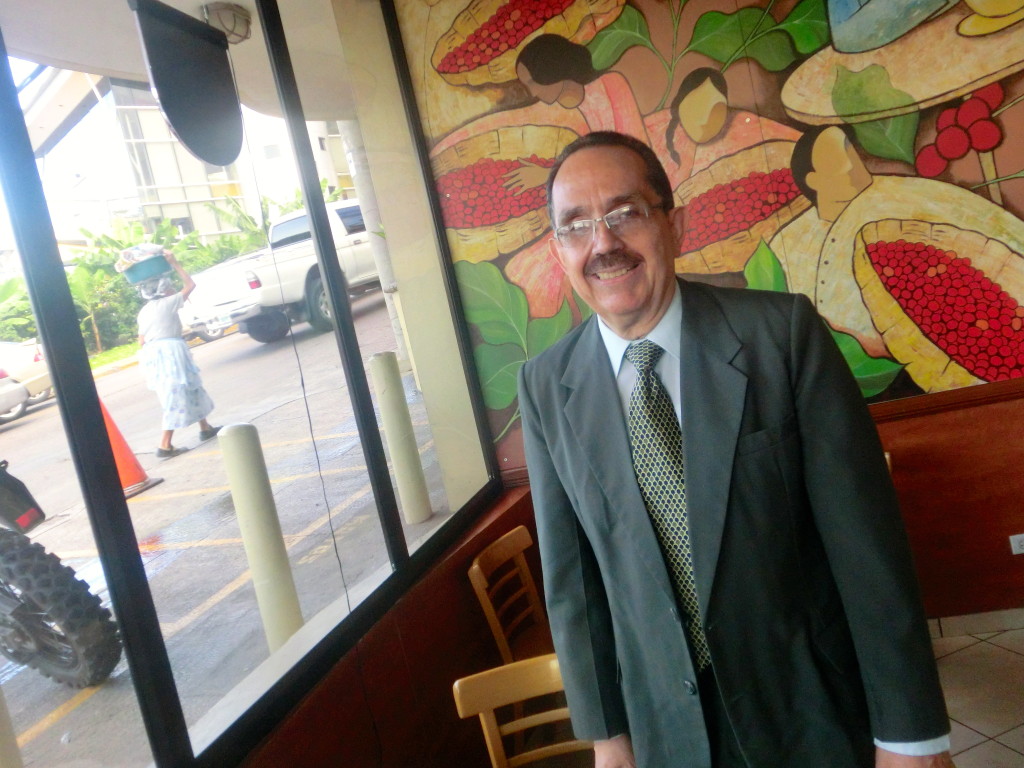TEGUCIGALPA — In the final moments of an hourlong interview about the situation on human rights in Honduras, Dr. Leo Valladares mentioned his upcoming trip to meet Germany’s president to discuss human rights throughout Latin America.![]()
Though it was obvious Valladares was excited about the opportunity to bring his four-decade long crusade for human rights to Berlin, his eyes sparkled when he talked about visiting his daughter, who also lives in Europe.
None of Valladares’s children live in Honduras now. Not any more.
He leaned in, with the same gentle tone that he’d been using for the past hour, to tell me that he, too, has lost a son. (That son, Rodrigo, was killed in a carjacking in January 2009).
‘We all know who did it,’ he said, without rancor or bitterness — and Valladares, whose particular worldview is suffused with the Jesuit social justice teachings of his high school days, publicly told the Tegucigalpa newspaper El Heraldo two years ago that he’d forgiven his son’s assassins, which is more forgiveness than most fathers would afford, no matter whether they’re in Honduras or Berlin.
Like so many other Honduran families (in a country with the world’s highest homicide rate), the tragic violence that’s afflicted Honduras with ever greater intensity over the past decade has taken a horrific toll of Valladares and his family as well.
‘At this point of my life, I should be at home, just resting. But there’s too much left to do here in Honduras,’ he said. ‘Human beings are perfectible, they have the power to change…. By doing little things, we can advance.’
Valladares served from 1988 to 1995 as a member of the Inter-American Commission on Human Rights, and he also served as the national commissioner of the Comisionado Nacional de los Derechos Humanos (CONADEH, National Commission of Human Rights). Today, he’s formed his own non-governmental organization, Asociación para una Ciudadanía Participativa (Association for Participatory Citizens) to continue the fight for human rights in Honduras. Like many of the Hondurans with whom I spoke earlier this month in Honduras, Valladares believes that respect for human rights has deteriorated since the 2009 coup that ousted former president Manuel Zelaya.
‘The problem of human rights in this moment remains very difficult. It has become very, very bad,’ he said. ‘One of the hugest problems is that the authorities don’t investigate murders, they don’t see it as a human rights violation. The state does not have the capacity to pursue the murderers, and they cannot bring them to justice. So we have a kind of impunity here. It’s a precarious situation. They benefit from the collective fear, and they use it to their advantage.’
Though Valladares started his career as a member of the small Partido Demócrata Cristiano de Honduras (DC, Democratic Christian Party of Honduras), he’s essentially been a political independent since he first assumed a role as a human rights official.
Though he officially supports none of the candidates in Sunday’s presidential election, he worries that Juan Orlando Hernández, in particular, poses a special threat to human rights — Hernández has made clear on the campaign trail that he believes the need for a military police and a more secure Honduras is more important than protecting the human rights of Hondurans who too often fear the police more than the criminals. That is, if you can tell the two apart — the police are, in the estimation of just about everyone in Honduras, thoroughly corrupted.
Valladares worries also about Xiomara Castro de Zelaya, the presidential candidate of the leftist Partido Libertad y Refundación (LIBRE, Party of Liberty and Refoundation), and whether she can truly be an independent president from her husband, the former president who was deposed in 2009. If she’s elected, Valladares also worries that the other traditional parties will join forces to block her agenda, causing gridlock.
‘The main thing is for the election to be held in a peaceful manner and for the results to be accepted,’ he said.
Part of the problem is a culture of corruption that tolerates a political elite that treats winning power as an invitation for personal enrichment.
‘One of the biggest problems in Honduras is the application of ethical values. Over here being thief of public goods is not socially unacceptable,’ he said.
Throughout the election, there’s no doubt that journalists and LIBRE candidates have been subject to abuses.
But in a wide-ranging conversation with Valladares, it’s clear that leftists and journalists are just the tip of the iceberg. For example, many Hondurans who leave their country for the United States face harrowing conditions — they travel hundreds of miles to reach the Mexican border (and Mexican officials are rougher than the US border patrol), cross over hundreds of miles of Mexican territory to attempt to cross the US border, at a cost of thousands of dollars and at the risk of drowning while crossing a river or dying of thirst in a northern Mexican desert. For women and children, the risks are even more terrifying — there’s no protection from sexual abuse or even human trafficking. What’s more, the number of Honduran emigrants is on the rise, thanks to horrific levels of trafficking and related violence. US official turned away more Hondurans at the US border (more than 32,000) in the first ten months of 2013 alone than in any other past year. Continue reading An interview with Dr. Leo Valladares, former Honduran human rights commissioner
